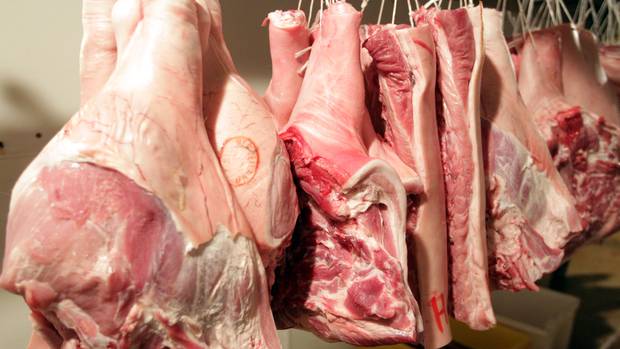Only Muslims can get jobs? how is that NOT favouritism?

Red meat waits for processing at Holly Bacon in Hastings.
Officials have poured cold water over a Kiwi farmer’s concerns that New Zealand’s meat industry only caters to the Muslim religion.
The majority of meat works in New Zealand are halal-certified and comply with strict Islamic guidelines, including that the beast must have its throat cut by a Muslim slaughterman in the name of Allah while it is facing towards Mecca.
Kiwi farmer Ken Riddle told NZME the halal-requirements compromised his own Christian beliefs and recently decided to slaughter one of his cows at his North Island farm in order to avoid funding another religion.
Riddle questioned whether the halal-criteria was discriminating New Zealand meat workers based on religion as those employed to actually slaughter the animals all had to be practising Muslims.
“I thought we were supposed to be secular,” he said.
Only around 50,000 people in New Zealand affiliate with the Muslim religion and the NZ Meat Workers Union said workers have raised similar concerns as Riddle over the years, particularly around Muslim slaughtermen breaking seniority ranks at the plants.
“There’s always been problems with it and they come up every now and again,” said Mike Nahu, the union’s national president.
“The issues are raised and discussed and we’ve concluded that this is the only way for the work to be done. If the meat isn’t killed according to [Muslim] religious beliefs, you can’t sell it to them,” he said.
In the 12 months to September 2015, New Zealand exported 239,000 tonnes of halal-certified meat – representing just over a quarter of the total red meat export product for that entire year, according to the Meat Industry Association.
New Zealand’s meat industry has had over 40 years experience producing halal-certified product, said Sirma Karapeeva, the association’s trade and economic manager.
“This is not something new – it’s been in play for a long time,” she said.
The meat industry needs to be flexible in order to maximise the economic value of each animal and to export to numerous countries around the world. Halal-requirements are a core feature of those flexibilities, she said.
Individual companies make commercial decisions as to whether or not they want to abide by the regulations, but the majority of plants in New Zealand slaughtering cattle for export are halal-certified, Karapeeva said.
“Over 90 per cent of what we produce is exported and without being halal-certified they can’t send the products to Muslim countries.”
The industry had received queries about what exactly halal-certification meant, but Karappeva said these queries did not amount to complaints or concerns.
Federated Farmers was also not aware of any concerns raised about halal-requirements in recent years, said spokeswoman Leigh Catley.
Food Safety Minister Jo Goodhew said New Zealand’s red meat sector accounted for 13 per cent of all goods exported for the year ended 30 September, 2014. The industry was worth a total of $6.65 billion over that period, she said.
The world-wide halal food market has dramatically increased in the past decade, Goodhew said, adding that it is now estimated to represent 16 per cent of the entire global food industry.
“The decision on whether or not to carry out Halal meat processing, or any other cultural/religious requirements, is a commercial decision taken by exporting companies. That decision is driven by the import requirements of the countries that they wish to export to,” she said.
In New Zealand, animals are stunned and unconscious before they are slaughtered, complying with both animal welfare and halal requirements.
Despite the fact that only a small percentage of Kiwis identify as Muslim, the bulk of New Zealand’s red meat product is exported internationally, including to many Muslim countries, said Sultan Eusoff, member of the halal meat contract negotiation of the Federation of Islamic Associations of New Zealand.
It was an “essential and fundamental requirement” that any slaughterman of halal-certified meat was a practising Muslim – but all other workers involved with the product don’t have to be, Eusoff said.

If it’s all kosher and above board why is it so secretive? Why isn’t meat defiled by halal clearly marked as such? Surely it must be marked to send it to the desert dwellers so why isn’t it marked for the domestic market?
And if they can run two lines – one marked and one not, why can’t they run two lines – one halal defiled slaughter and one not?
Someone’s covering up the very lucrative scam.
Deceiving the general public is what islam does across the board.I bet Kiwis pay for halal beef at their local butcher unless the guy has a backbone.Thats an additional markup which islam keeps tax free.Choke on that consumers